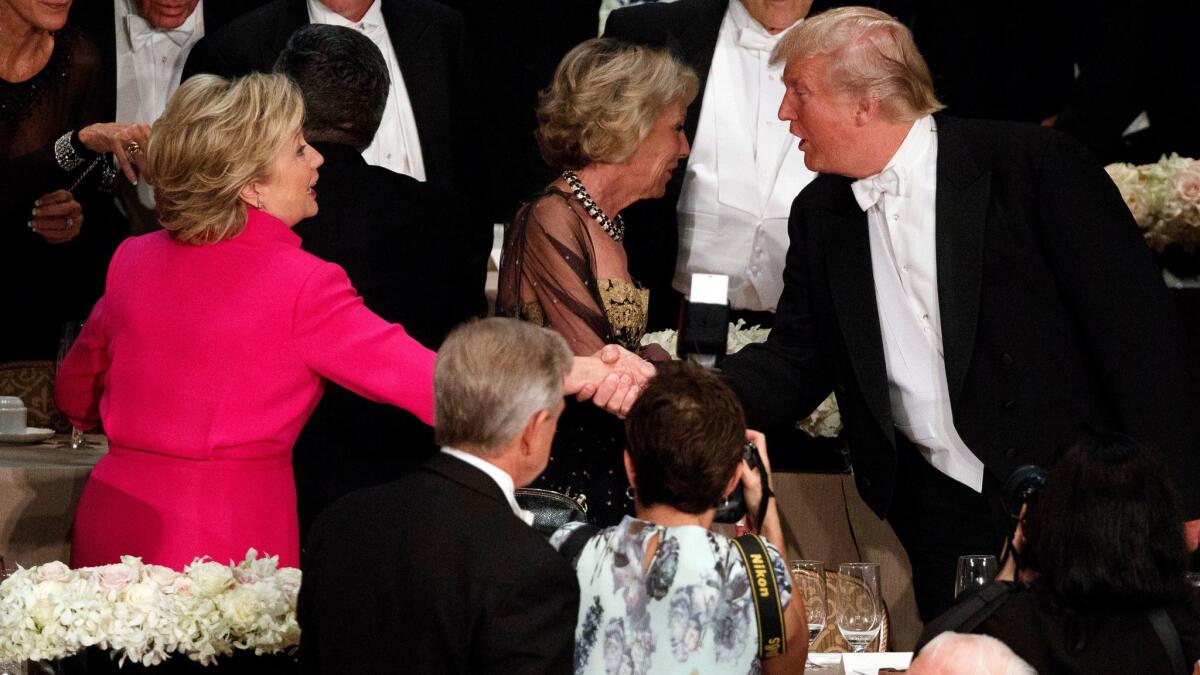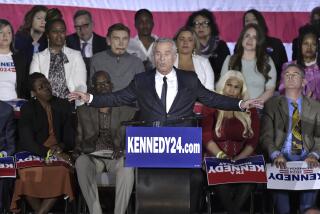Op-Ed: The country needs a graceful loser in this election. The future of American democracy depends on it

On Wednesday tens of millions of Americans will be disappointed, frustrated and, in a great many cases, very angry. Their candidate for president will have lost the election, and many of them will be convinced the outcome was unfair or, given their intense dislike for the winner, simply unacceptable.
The winner should of course make clear that he or she is president of all Americans, not just his or her supporters; but it will be up to the loser to unite us.
A return to post-election normality is not impossible. That, after all, is what we’ve come to expect, even after hard-fought and occasionally bitter campaigns. Despite having received more votes than George W. Bush and seeing his electoral college defeat sealed by a controversial court decision, Al Gore accepted the outcome.
But no modern campaign has come close to the level of vitriol Americans have been exposed to in this election season. Each candidate has declared the other unfit for office and Donald Trump has suggested he may not accept the vote tally unless he wins. Trump and Hillary Clinton are deeply unpopular and Trump’s supporters have repeatedly called for Clinton to be jailed or hanged. This cannot be allowed to be the new normal if American democracy is to survive.
Democracy is intentionally contentious but governance requires, at some point, graceful acknowledgment of an election’s results.
The Clinton and Trump campaigns have created transition teams to determine first steps — policy priorities and top-level appointments — for their new administrations. Neither side, though, is likely to have thought through how best to transition to a new identity as the team, and candidate, that lost the election.
Democracy is intentionally contentious but governance requires, at some point, graceful acknowledgment of an election’s results and at least some level of commitment to cooperation. Without that willingness, there will be neither money nor policies for anything from national security to bridge repair, from medical research to disaster relief. Unless our leaders are able to function as Americans in common, the United States will be in danger of becoming a failed nation, unable to meet its obligations at home or provide leadership abroad.
Presidents are not automatically entitled to approval of everything they propose — that’s why most of the power of the federal government rests with Congress — but whoever the people choose to be their president is entitled to a fair hearing and an honest attempt to find grounds for some level of mutual accord.
The catch is that a president cannot persuasively make that argument — it would be perceived as self-serving and little more. Only the loser can make the case that we must remain committed to the American ideal of deliberative democracy.
Whether framed as a campaign to “make America great again” or to make us “stronger together,” Clinton and Trump attempted to sell themselves to us as people who truly love America. How they comport themselves if they lose the election will tell us whether that’s true.
Many Americans are angry about what they rightly see as the failures of government, promises made but not kept. Ironically, it is the stubborn “principled” unwillingness to compromise, by hard-liners of both the right and left, who have made it impossible to reach the agreements necessary to at least address the legitimate concerns these voters have raised. There are steps that can be taken to make American government work better than it does now — changes to election laws to reduce the power of partisan ideologues, reducing the influence of money, improving civic literacy and teaching critical thinking skills. But nothing will be more important than a decision by the losing candidate and that candidate’s supporters to come together as soon as possible after the election to pledge a level of resistance that stops short of undermining the constitutional democracy that has always been the basis of American exceptionalism.
On Nov. 9, whoever loses the election should publicly announce acceptance of the results, urge supporters in Congress to work with the new president to forge bipartisan consensus whenever possible, and vow to honor the “loyal” in “loyal opposition.”
Trump and Clinton despise each other, their supporters share the animus and many Americans don’t like either one. But this is not about Donald Trump or Hillary Clinton; this is about the future of American constitutional democracy and the obligation to protect it rests on both candidates, win or lose.
Mickey Edwards is a former U.S. congressman who was a member of the House Republican leadership. He is a vice president of the Aspen Institute.
Follow the Opinion section on Twitter @latimesopinion or Facebook
More to Read
A cure for the common opinion
Get thought-provoking perspectives with our weekly newsletter.
You may occasionally receive promotional content from the Los Angeles Times.






